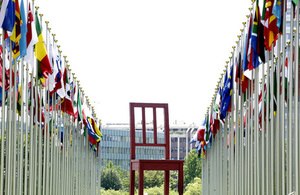Human Rights Council 37: Explanation of Votes on Resolutions on Israel and the Occupied Palestinian Territories
This UK statement was delivered at the 37th session of the Human Rights Council during the explanation on votes on resolutions on Israel and the Occupied Palestinian Territories, held 23 March 2018.

The Human Rights Council takes place at the Palais des Nations in Geneva
Let me reiterate the UK’s support for a two-state solution that ends the Israeli-Palestinian conflict.
The UK is a committed member of the Human Rights Council. An international rules-based system dedicated to promoting and protecting human rights is in everyone’s interest. But the disproportionate number of resolutions against Israel and the existence of a dedicated agenda item (“Item 7”) that singles out Israel does little to advance dialogue, stability or mutual understanding.
Last year, for these reasons, we placed this Council on notice. We said that if this disproportionate focus remained, we would adopt a policy of voting against resolutions concerning Israel and the Occupied Territories. Regrettably, we have seen very little change. Therefore, we will again vote against the Syrian Golan resolution and, for the first time, the Accountability resolution. Unless things change, we will move to vote against all resolutions.
Our vote against the Accountability resolution is not a vote against the importance of accountability and justice in the Occupied Palestinian Territories. It is a vote against the Council’s disproportionate focus on Israel. However, we must not lose sight of the deeply concerning situation in the Occupied Palestinian Territories. Over the past year, we have seen plans for the first new settlement community in over 25 years and the retroactive approval of unauthorised outposts deep in the West Bank. It has long been our position that Israeli settlement activity is illegal under international law. We continue to be alarmed by the treatment of Palestinian minors in Israeli military detention. We have also seen horrific terrorist violence against Israelis, which must be condemned in the strongest terms. All of this gravely undermines the viability of a two-state solution.
Therefore, today, the UK is voting in support of the Self-Determination and Human Rights resolutions. But the credibility and impact of these resolutions is repeatedly undermined by their being tabled under Item 7. This cannot continue.
As in 2017, today we are abstaining on the Settlements resolution. The implications of the 2016 resolution, specifically creating a database of businesses that trade with settlements, remains concerning. We urge those responsible for implementing this database to avoid doing so in ways that would exacerbate tensions and risk creating a de facto blacklist.
Mr President, Opposition to Item 7 is shared by many in this Council, but few are prepared to take action. This must change. Together we can achieve our collective goal of a Council that operates fairly, absent bias, and is without Item 7.